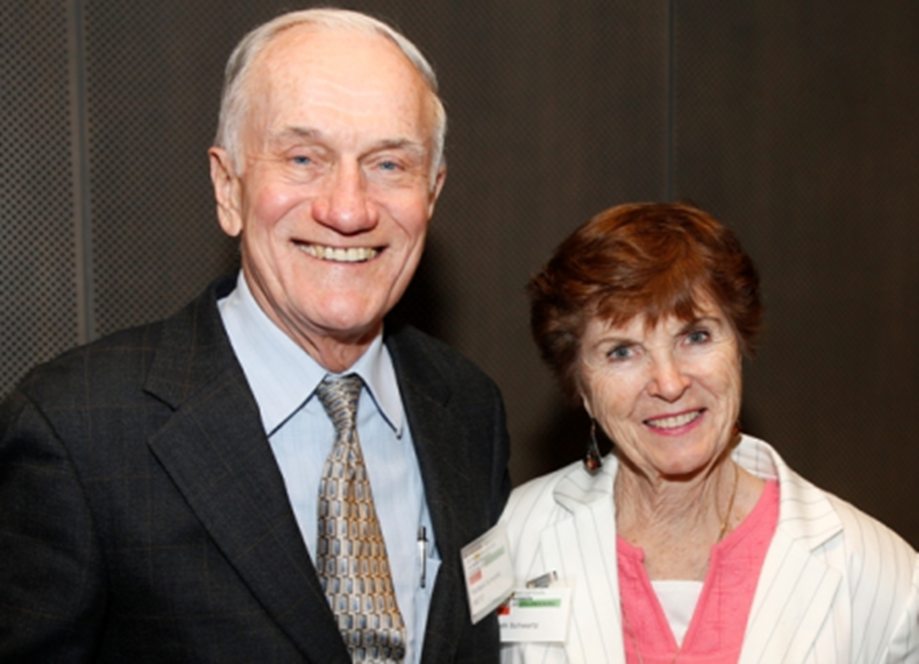Impact of Cooper: Interview with Richard “Dick” Schwartz ME’57
POSTED ON: June 9, 2021

Dick Schwartz ME'57 is an aerospace engineer and executive who played a pioneering role in the development of Navstar GPS, the satellite-based navigation system, a utility that affects approximately 5 billion of the world’s population today. For this, he and his team were awarded the 2019 Queen Elizabeth Prize for Engineering, which some call the Nobel Prize for Engineering. After graduating from The Cooper Union and earning an MBA from Pepperdine University in 1972, Schwartz began a 32-year career with Rockwell International. He led the development of rocket propulsion systems, a space station power system, and the Saturn V program.
From 1964 to 1973, Schwartz worked on the development of the Saturn launch vehicle, received a NASA Public Service Award (1972) and a NASA Certificate of Appreciation (1973). He was named president of Rockwell International’s Rocketdyne in 1983 and remained in that position for six years, responsible for the company’s work as the prime contractor on the space shuttle main engine. In 1989, he became president of Hercules Aerospace Company, and from 1995 to 1999 was president and CEO of Alliant Techsystems. In 1998, he was named to the United States Space Foundation’s Space Technology Hall of Fame for his innovations in GPS technology. He has served as a member of the Board of Trustees of The Cooper Union. In 1990, he received the CUAA Gano Dunn Award, and in 2001, the CUAA Alumnus of the Year Award. Schwartz was also inducted into The Cooper Union Hall of Fame in 2009.
Schwartz recognizes the significant role Cooper has played in his success and you will too. Schwartz’s great affection for The Cooper Union — the people he has met and the lessons he has learned through his Cooper Union education still is unwavering. This alumni perspective has made Schwartz more gratified to give back to his alma mater in ways that mean the most to him. That gratification grows even further when he considers the impact of his actions.
In 2000, Schwartz decided on a way to pay it forward. He created the Challenge of Excellence Program where he made a matching gift of $500,000 to The Cooper Union. This program added an extra $1 million to The Cooper Union Annual Fund, and it finished the year at over $3 million. Schwartz believes that generosity from alumni produces ripple effects through the entire Cooper Union community while highlighting the commonality of the student experience.
We spoke with Mr. Schwartz to learn more about how Cooper has positively affected his career journey, the value of staying involved, and giving to others.
Tell me about your Cooper experience. What was most memorable about your time here or what did you find was most influential to your success?
What brought me to Cooper Union was the fact that it was free. That was a big attraction for me. I took the Cooper Union entrance exam and was accepted. Shortly after getting accepted, I learned that the quality of the students was unbelievably good. They were top notch. First cabin in all regards. I ran into a bunch of other very smart, poor kids. And you know, it is like playing tennis with somebody better than you. Each time you play with them, you are going to get a little better. It was good to be with a smart crowd. I did not know it at the time, but as I kept going at Cooper; I was building a toolbox of knowledge that I could carry with me anywhere. I collaborated with teams of students and created a management philosophy that I have used throughout my career. A team is stronger than the sum of its individual parts. Think about this and apply it in the future.
What do you value most about your degree from Cooper?
Cooper Union provided me with a good toolbox from which I could build. With a Cooper Union education, I could compete with peers from other schools around the country.
What motivates you to give to Cooper and why is it important for others to give?
Cooper Union gave so much to me. I always felt drawn to somehow repay it. That usually comes as paying it forward and helping those who are following in my footsteps. I did well in my career and had the financial resources to support Cooper, and continue to stay connected, committed, and involved. It is important to do so. It is also important to bridge the gap between alumni and students. I think that will drive a greater sense of loyalty and pride. Think in real terms what the Cooper Union degree means to you and your family, and then PASS IT ON!
What one piece of advice do you have for current Cooper students or for students who will be graduating, and entering the “real world” soon?
Continue building a lifelong relationship with Cooper. Stay connected. Share what you are working on with other alumni and current students. Give back in various ways as repayment for how The Cooper Union experience has influenced your lives. Always do the best you can at any job and make sure that failure is not an option!




